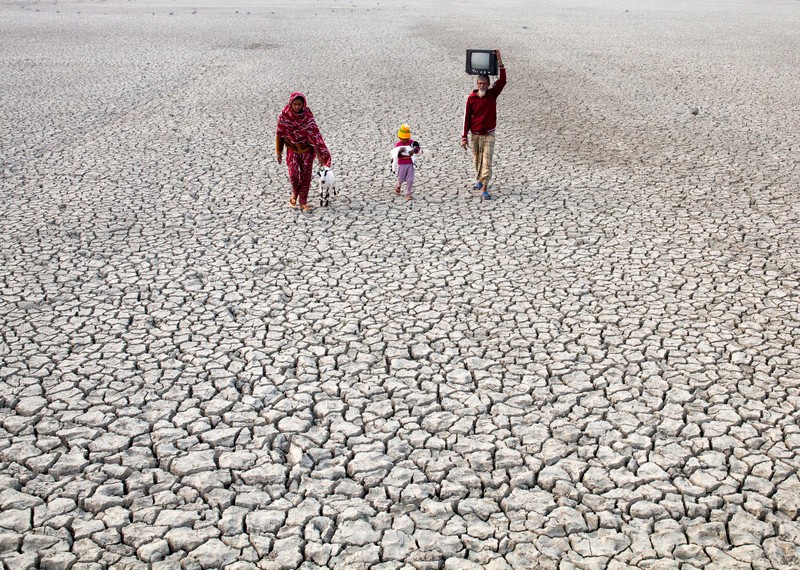Climate change
تفاصيل العمل
It is easy to not pay enough attention to our planet to see the human cost of its decline: hunger, displacement, unemployment, disease and death.
Millions of people are already suffering the catastrophic effects of extreme weather disasters exacerbated by climate change – from prolonged droughts in sub-Saharan Africa to devastating tropical cyclones sweeping across Southeast Asia, the Caribbean and the Pacific. Extreme temperatures have caused deadly heat waves in Europe and wildfires in South Korea, Algeria and Croatia. There were severe floods in Pakistan, while a severe and prolonged drought in Madagascar left one million people with very limited access to adequate food.
The devastation that climate change is causing, and will continue to cause, is a grave alarm for humanity. But there is still time. The world's leading scientific body for assessing climate change - the Intergovernmental Panel on Climate Change (IPCC) - warns that global greenhouse gas emissions must "peak before 2025 at the latest, and be reduced by 43 percent by 2030 if we are to Limit the global temperature rise to 1.5°C and avoid a real catastrophe.
Massive action must be taken immediately, but this urgency must not justify the violation of human rights.
A woman and her daughter stand on a dry sandy road, their faces are turned from the camera as they look at a dark, hazy skyline where wildfires are raging.
A woman and a child stand in a field watching forest fires during the deadly heat wave in Turkey in 2021.
Previous
Next
The tragic effects of climate change have revealed with frustrating clarity how integral a healthy environment is to the enjoyment of all our other rights.
Agnes Callamard, Secretary General, Amnesty International
How does climate change affect human rights?
Human rights are closely linked to climate change because of its impact not only on the environment, but on our well-being as well. Its effects will continue to increase and deteriorate with the passage of time, and will cause destruction for current and future generations. Therefore, the failure of governments to take action to address climate change, in light of overwhelming scientific evidence, may be the most serious violation of human rights for different generations in history.
Climate change and the right to life
We all have the right to live in freedom and security. But climate change threatens the lives and safety of billions of people on the planet. The most obvious example is provided by extreme weather events such as storms, floods, and wildfires. However, there are many other, less obvious ways in which climate change threatens human life. The World Health Organization predicts that climate change will kill 250,000 people a year between 2030 and 2050.
Climate change and the right to health
We all have the right to the highest attainable standard of physical and mental health. According to the Intergovernmental Panel on Climate Change, the main health impacts of climate change will include increased risks of injury, disease and death due to more intense heat waves and fires, among others; increased risk of undernutrition as a result of reduced food production in poor areas; and increased risk of food- and water-borne, and vector-borne diseases. People, especially children, who are exposed to traumatic events such as natural disasters exacerbated by climate change can suffer from post-traumatic stress disorder.
Climate change and the right to housing
We all have the right to an adequate standard of living for ourselves and our families, including adequate housing. But extreme weather events related to climate change, such as floods and wildfires, are already destroying people's homes and displacing them. Drought can lead to significant harmful changes in the environment, while rising sea levels threaten the homes of millions of people in low-lying areas around the world.
Climate change and the right to water and sanitation
We all have the right to safe water and sanitation that ensures we stay healthy. But a combination of factors, such as melting snow and ice, declining precipitation, rising temperatures, and rising sea levels, show that climate change is affecting the quality and quantity of water resources. There are currently 785 million people who do not have access to a source of water or sanitation that is likely to be safe, and climate change will only make this worse.
What causes climate change?
Fossil fuel burning
Agriculture and deforestation
Changing the purpose of land use
The planet has always experienced large fluctuations in average temperatures. However, in the current period, the temperature is rising faster than ever. Man-made activities have increased the concentration of greenhouse gases in the atmosphere. They cause the average temperature of our planet to increase at a rate too fast for living things to adapt to.
The burning of fossil fuels such as coal, oil and gas is the source of most emissions for almost all economic sectors. It is the source of more than 70 percent of global greenhouse gas emissions.
The Intergovernmental Panel on Climate Change estimates that nearly a quarter of all greenhouse gas emissions come from agriculture and forestry (23 percent), making it the second highest emitter after the energy sector. About 40 percent of these emissions come from the normal digestion process that occurs in ruminant animals such as cattle, sheep, and goats. Land use and land use purpose change such as deforestation, forest degradation and forest fires are a serious source of greenhouse gas emissions. These are often associated with activities such as the conversion of jungle areas
بطاقة العمل
| اسم المستقل | الزوز E. |
| عدد الإعجابات | 0 |
| عدد المشاهدات | 14 |
| تاريخ الإضافة | |
| تاريخ الإنجاز |
